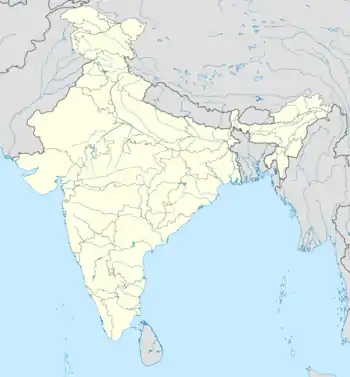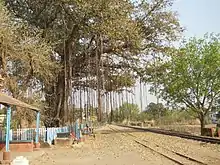Ahmedpur, Birbhum
Ahmedpur (also spelt Ahmadpur or Amodpur) is a census town in Sainthia CD block in Suri Sadar subdivision of Birbhum district in the Indian state of West Bengal. Ahmedpur is under the jurisdiction of Sainthia police station. The census town is remembered in the area for its sugar mill and as one end of the vintage narrow gauge railway. The office of the Block Development Officer, Sainthia Block is situated here, adjacent to the Ahmedpur railway station. It hosts a growing local business centre, being well connected with Kolkata and other cities of West Bengal via railway.
Ahmedpur
Amodpur | |
|---|---|
Census Town | |
 Ahmedpur Location in West Bengal, India  Ahmedpur Ahmedpur (India) | |
| Coordinates: 23.8365°N 87.6912°E | |
| Country | |
| State | West Bengal |
| District | Birbhum |
| Police station | Sainthia |
| Area | |
| • Total | 1.3 km2 (0.5 sq mi) |
| Population (2011) | |
| • Total | 9,242[1] |
| Languages | |
| • Official | Bengali, English |
| Time zone | UTC+5:30 (IST) |
| PIN | 731201 |
| Telephone code | 03463 |
| ISO 3166 code | IN-WB |
| Vehicle registration | WB |
| Lok Sabha constituency | Bolpur |
| Vidhan Sabha constituency | Labpur |
| Website | birbhum |
Geography
| Cities and towns in Suri Sadar subdivision of Birbhum district M: municipal city/ town, CT: census town, R: rural/ urban centre, B: Barrage. Owing to space constraints in the small map, the actual locations in a larger map may vary slightly |
Location
Ahmedpur is located in the alluvial plain of the Mayurakshi River. It has hot and dry summers, spread between March and May, followed by the monsoon from June to September. Seventy-eight percent of the rainfall occurs during this period.[2] Although large trees are rare, small and medium vegetation, with short grass and bushes can be found alongside the road.
Demographics
As per the 2011 Census of India, Ahmadpur had a total population of 9,242 of which 4,697 (51%) were males and 4,545 (49%) were females. Population below 6 years was 969. The total number of literates in Ahmadpur was 6,722 (81.25% of the population over 6 years).[3]
Infrastructure
As per the District Census Handbook 2011, Ahmedpur covered an area of 1.61 km2. There is a railway station is at Ahmedpur. Buses are available in the town. It has 10 km roads and both open and closed drains. The major source of protected water supply is from bore well pumping and over head tank. There are 1,083 domestic electric connections and 14 road light points. Amongst the medical facilities it has are 1 hospital with 40 beds and 13 medicine shops. Amongst the educational facilities it has are 7 primary schools, 3 middle schools, 3 secondary schools and 2 senior secondary schools. Amongst the social, recreational and cultural facilities there are 1 working women's hostel, 1 cinema theatre, 1 auditorium/ community hall, 1 public library and 1 reading room. It has the branches of 2 nationalised banks, 1 cooperative bank and 1 agricultural credit society. Amongst the commodities it produces are rice and mustard oil.[4]
Economy
Ahmedpur sugar mill
The West Bengal government purchased the assets of the National Sugar Mills through a court sale on 4 June 1973, during its liquidation, enabling the West Bengal Sugar Industries Development Corporation to achieve its objective of promoting and developing the sugar industry, and also preventing job losses in the closed mill. After the Corporation took possession of the mill on 1 September 1973, it was renamed Ahmedpur Sugar Mill. It went into production in the 1974–75 season. It has a crushing capacity of 600 tonnes per day, and procures sugarcane from an area comprising the whole of Birbhum District, part of Bardhaman, Nadia and its captive farms in the district of Murshidabad, covering a distance over 25 km to 130 km from the mill gate. However, the scattered situation at a far off distance from the mill prevents the purchasing of an optimum quantity of sugarcane for crushing due to high costs related to transport. As a result of the difficulties for downscale plantations of sugarcane in Birbhum district and insufficient source of sugarcane from other zones, the working results of the mill for the above seasons were poor.[5] This sugar mill has not been functioning for around 7–8 years.
Another traditional industry is rice milling. Ahmedpur has a number of rice mills, some of which date from the pre-independence era. Ahmedpur also has the oldest Solvent Extraction Plant for Rice Bran Oil in West Bengal. Apart from the sugar mill there is also one wine processing factory.
Business
Ahmedpur is a growing centre for small and home-based business. Good transport links with Kolkata have enabled the development of a large market. Good transport facilities have allowed the growth of many small-scale handicraft industries. Goats, cattle and other animals are also sold in the market of Ahmedpur.
Transport

Ahmadpur Junction railway station is situated on the Bardhaman – Sainthia section of Sahibganj Loop. The 52 km long narrow gauge (2' 6") Ahmedpur Katwa Railway terminates in Ahmedpur. Four pairs of trains run daily in the section. It has remained a single line since its opening. Indian Railways took over the narrow gauge tracks between Katwa and Ahmedpur, and Katwa and Bardhaman from McLoyd and Company in 1966. The railways have identified low passenger numbers and unwillingness to buy tickets as the reasons behind the losses incurred by the narrow gauge section.[6] The section has not been functioning for the last few years and the whole Ahmedpur-Katwa stretch is currently being converted to the broad gauge line. Nowadays the authority decided to turn this section off. The authority decided to make broad gauge railway instead of this narrow gauge. Construction of the new railway is currently underway. In a few days, passengers can enjoy a better railway service here. Now the conversion from narrow gauge to broad gauge is completed and also overhead electrification is done. On 22 November 2017 a trial journey took place from Ahmedpur to Katwa.[6]
Notable residents
Rajat Bhushan Dutta, along with Kamada Kinkar Mukherjee (father of former Indian President Pranab Mukherjee) who was deported to Andaman Islands for 12 years for his involvement in the Birbhum Conspiracy Case, was born at Ahmedpur in 1908. Rajat Bhushan Dutta was a revolutionary freedom fighter of India.Joined the Yugantar Party under Bipinbehari Ganguly group.He was married before his arrest in November 1933 in connection with Birbhum Conspiracy Case and sentenced to 12 years transportation. Deported to Andamans in November 1935. He took part in second hunger strike. After release in 1944 rearrested under Defense Of India rules.[7]
Education
Ahmedpur has government-aided higher-secondary schools for boys and girls, as well as primary co-education schools. The Jai Durga High School & Ramkrishna high school are the main school for boys in the region, situated close to the station. Students from the neighboring villages are often seen admitted to the government schools here. Proximity and good connectivity to Burdwan encourages many students to attend the University of Burdwan. Many college students from here travel to nearby village Labhpur to attend the Labhpur Shambhunath college and also travel to Sainthia to attend the Abhedananda Mahavidyalaya. Recently two B.Ed and Basic Training Colleges were established at Ahmedpur.
Connectivity
Ahmedpur Junction station is an important station of Birbum District. Most people used this railway station, including parts of Burdwan & Murshidabad Dist to go to Kolkata. Previously there was historical Narrow-gauge railway from Ahmedpur to Katwa route. Most express trains are connected to Howrah/Sealdha/North-East/Bhagalpur/Patna/Delhi/Kolkata stations. Buses go daily to Labhpur and nearby villages through the Ahmedpur-Katwa road.
Culture
Both Hindus and Muslims live in this town. The holy "Bakreswar" river runs through Juinta village and Kusumjatra village nearby. Tentuldihi Mallick Bari, which is 6–7 km away from Ahmedpur, is famous for its famous Durga puja which has been celebrated for more than 300 years. Many people come to Tentuldihi in October to enjoy this puja.
References
- http://www.citypopulation.de/php/india-westbengal.php?adm2id=1908
- Choudhuri, Tapan, Unnayaner alokey Birbhum, Paschim Banga , Birbhum Special Issue, February 2006, (in Bengali), pp. 60-61, Information & Cultural Department, Government of West Bengal.
- "2011 Census – Primary Census Abstract Data Tables". West Bengal – District-wise. Registrar General and Census Commissioner, India. Retrieved 16 July 2019.
- "District Census Handbook Birbhum, Census of India 2011, Series 20, Part XII A" (PDF). Section II Town Directory, Pages 1025- 1033. Directorate of Census Operations V, West Bengal. Retrieved 16 July 2019.
- "Directorate of Industries, West Bengal". West Bengal Sugar Industries Development Corporation Limited. Department of Commerce and Industries, Govt. of West Bengal. Retrieved 12 September 2007.
- "Narrow gauge gets a new lease of life". The Statesman, 14 October 2004. Retrieved 12 September 2007.
- "This is about Andaman Cellular Jail". Revolutionaries listed Alphabetically by their Surnames. Andaman Cellular Jail. Archived from the original on 20 May 2006. Retrieved 12 September 2007.